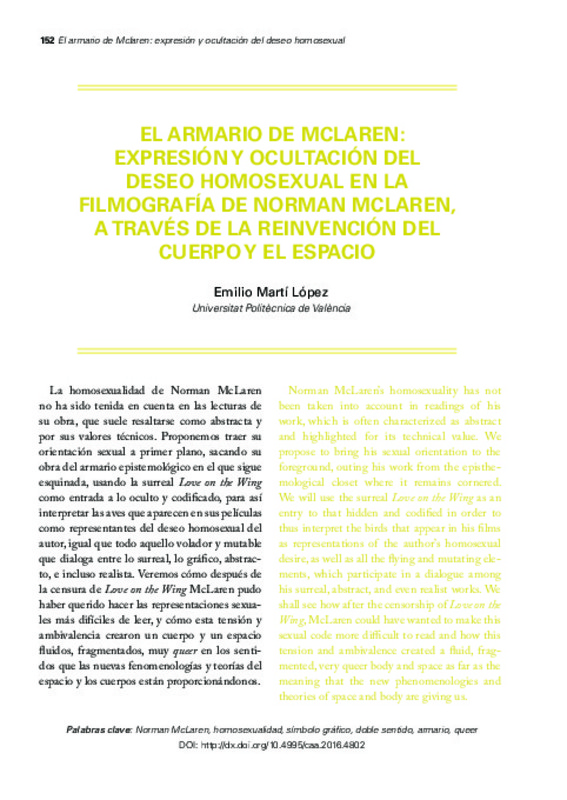JavaScript is disabled for your browser. Some features of this site may not work without it.
Buscar en RiuNet
Listar
Mi cuenta
Estadísticas
Ayuda RiuNet
Admin. UPV
El armario de McLaren: expresión y ocultación del deseo homosexual en la filmografía de Norman McLaren, a través de la reinvención del cuerpo y el espacio
Mostrar el registro completo del ítem
Martí López, E. (2016). El armario de McLaren: expresión y ocultación del deseo homosexual en la filmografía de Norman McLaren, a través de la reinvención del cuerpo y el espacio. Con A de Animación. (6):152-173. https://doi.org/10.4995/caa.2016.4802
Por favor, use este identificador para citar o enlazar este ítem: http://hdl.handle.net/10251/79537
Ficheros en el ítem
Metadatos del ítem
| Título: | El armario de McLaren: expresión y ocultación del deseo homosexual en la filmografía de Norman McLaren, a través de la reinvención del cuerpo y el espacio | |
| Autor: | Martí López, Emilio | |
| Entidad UPV: |
|
|
| Fecha difusión: |
|
|
| Resumen: |
[EN] Norman McLaren’s homosexuality has not been taken into account in readings of his work, which is often characterized as abstract and highlighted for its technical value. We propose to bring his sexual orientation to ...[+]
[ES] La homosexualidad de Norman McLaren no ha sido tenida en cuenta en las lecturas de su obra, que suele resaltarse como abstracta y por sus valores técnicos. Proponemos traer su orientación sexual a primer plano, sacando ...[+]
|
|
| Palabras clave: |
|
|
| Derechos de uso: | Reconocimiento - No comercial - Sin obra derivada (by-nc-nd) | |
| Fuente: |
|
|
| DOI: |
|
|
| Editorial: |
|
|
| Versión del editor: | https://doi.org/10.4995/caa.2016.4802 | |
| Tipo: |
|








